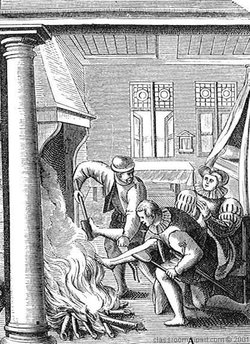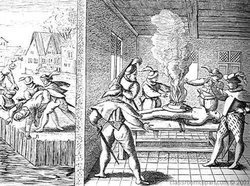Inquisition
|
|
The Inquisition (latin: Inquisitio Haereticae Pravitatis Sanctum Officium) was an office of the Roman Catholic Church charged with suppressing heresy. Its actions and interactions with the local governments are subjects of considerable historical inquiry.
| Contents |
Origin
The Inquisition was a permanent institution in the Catholic Church charged with the eradication of heresies. Unlike many other religions (e.g., Buddhism, Judaism, Islam), the Catholic Church has a hierarchical structure with a central bureaucracy. After Constantine ended the persecution of the church, the local administrative structures of the Church under the Roman Empire (later the Western Roman Empire) were able to then focus on dealing with heresy, and those whose beliefs or practices deviated sufficiently from the orthodoxy of the councils now became the objects of efforts to bring them into the fold.
Heresies (from Greek haeresis, sect, school of belief) were a problem for the Church from the beginning. Acts 15 recounts the convening of a council in Jerusalem to deal with the heresy of the Judaizers, who had contended with the Jerusalem faction in Asia and especially Galatia. In the subsequent centuries there were the Arians and Manicheans; in the Middle Ages there were the Cathari and Waldenses; and in the Renaissance there were the Hussites, Lutherans, Calvinists, and Rosicrucians. Efforts to suppress heresies were initially ad hoc. But in the Middle Ages a permanent structure came into being to combat heresies. Beginning in the 12th century, Church Councils required secular rulers to prosecute heretics.
History
There were four Inquisitions; in chronological order, they were the Medieval Inquisition, the Spanish Inquisition, the Portuguese Inquisition and the Roman Inquisition.
Medieval Inquisition
- Main article: Medieval Inquisition
The first of the Medieval Inquisitions is called the Episcopal Inquisition and was established in the year 1184 by a papal bull, an official letter from the Pope, entitled Ad abolendam; "For the purpose of doing away with". The Inquisition was in response to the growing Catharist heresy in southern France. It is called the "episcopal" because it was administered by local bishops, which in Greek is episcopos. The episcopal Inquisition was not very effective for many reasons (see Medieval Inquisition).
The Papal Inquisition in the 1230s was in response to the failures of the episcopal Inquisition and was staffed by professionals, trained specifically for the job as decreed by the Pope. Individuals were chosen from different orders and secular clergy, but primarily they came from the Dominican Order who had a number of traits that made them suitable (see Medieval Inquisition).
After the 13th Century the Inquisition spread northward to Germany and Scandinavia. In northern Europe the Inquisition was considerably more benign: in the Scandinavian countries it had hardly any impact (although northern Europe had its own institutions such as the "witchhunt"). The Inquisition was never instituted in England, but Christopher Columbus carried it with him to the New World.
Spanish Inquisition
Unexpectedly, at the end of the 15th century, under Ferdinand and Isabella of Castile, the Spanish inquisition became independent of Rome. In its dealings with converted Muslims and Jews and also illuminists, the Spanish Inquisition with its "auto de fe" represents a particularly notorious period in the history of the Inquisition. This inquisition also gave rise to the Mexican Inquisition, which continued in the Americas until Mexican Independence.
Roman Inquisition
Pope Paul III established, in 1542, a permanent congregation staffed with cardinals and other officials, whose task it was to maintain and defend the integrity of the faith and to examine and proscribe errors and false doctrines. This body, the Congregation of the Holy Office, now called the Congregation for the Doctrine of the Faith, part of the Roman Curia, became the supervisory body of local Inquisitions. The Pope appoints one of the cardinals to preside over the meetings. There are usually ten other cardinals on the Congregation, as well as a prelate and two assistants all chosen from the Dominican Order. The Holy Office also has an international group of consultants, experienced scholars of theology and canon law, who advise it on specific questions. In 1616 these consultants gave their assessment of the propositions that the Sun is immobile and at the center of the universe and that the Earth moves around it, judging both to be "foolish and absurd in philosophy," and the first to be "formally heretical" and the second "at least erroneous in faith" in theology. This assessment led to Copernicus's De Revolutionibus Orbium Coelestium to be placed on the Index of Forbidden Books, until revised and Galileo Galilei to be admonished about his Copernicanism. It was this same body in 1633 that tried Galileo, condemned him for a "grave suspicion of heresy", and banned all his works.
Not all prosecutions of alleged heretics, atheists and other deviations from the Catholic faith were prosecuted by the Inquisition. In some countries, such as France under the ancien r駩me, atheists and blasphemers could be prosecuted by civilian courts, with the possible penalty of death.
Other Inquisitions
Even though the last Inquisition (The Spanish Inquisition) ended in 1834 almost 200 years ago, the word "Inquisition" remains a part of modern vocabulary; even those with no interest in European history associate it with negative meanings.[1] (http://www.nationalreview.com/comment/madden200406181026.asp) Because of the negative images associated with the Inquisition, the term has taken on a pejorative usage, and is often used to express disapproval, and is often used in a non-neutral manner, and not as a neutral historical descriptor.
- Portugal carried out religious investigations in its overseas colonies, particularly Goa in India, where methods similar to the European Inquisitions were used to eliminate a sort of syncretism that was developing there, which combined aspects of Hinduism and Catholicism (see Goa Inquisition).
- Some Christian fundamentalist authors like Jack Chick and Alberto Rivera, along with other like-minded authors, believe the Nazi Holocaust was an Inquisition against the Jews undertaken by Hitler, a Catholic, at the behest of the Pope. This interpretation of history is highly controversial and is rejected by professional historians.
- In modern American politics, United States Senate investigations are often called "Inquisitions" as a means of expressing disapproval of the investigators. For example some people call the Second Red Scare an inquisition.
- Robert Anton Wilson's book The New Inquisition (ISBN 1561840025) is critical of the application of the Scientific Method in the 20th century.
Derivative works
The Inquisitions have been the subject of many cultural works. Some include:
- The Spanish Inquisition was the subject of a classic Monty Python sketch.
See also
- witchhunt
- Konrad von Marburg
- Malleus Maleficarum
- Inquisitorial system
- List of Grand Inquisitors of Spain
- Historical revisionism (political)
References
- Edward M. Peters, Inquisition. (University of California Press, 1989). ISBN 0520066308
- A brief, balanced inquiry, with an especially good section on the 'Myth of the Inquisition'. This is particularly valuable because much of the history available in English of the Inquisition was written in the 19th century by Protestants interested in documenting the dangers of Catholicism or Catholic apologists demonstrating that the Inquisition had been an entirely reasonable judicial body without flaws.
- Henry Kamen, The Spanish Inquisition: A Historical Revision. (Yale University Press, 1999). ISBN 0300078803
- This revised edition of his 1965 original contributes to the understanding of the Spanish Inquisition in its local context.
- Cecil & Irene Roth, A history of the Marranos, Sepher-Hermon Press, 1974.
- Simon Whitechapel, Flesh Inferno: Atrocities of Torquemada and the Spanish Inquisition (Creation Books, 2003). ISBN 1840681055
- William Thomas Walsh, Characters of the Inquisition (TAN Books, 1997). ISBN 0895553260
- Favorable treatment of inquisitors.


